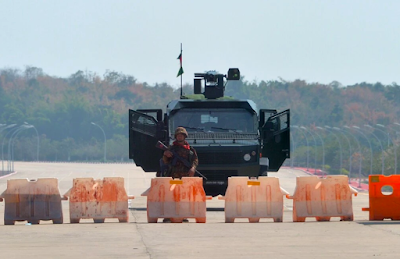Myanmar's coup, the international response and the China factor.
As international condemnation continues in response to the military coup in Myanmar, frustration grows with the United Nations Security Council's inability to take decisive action. Yet despite renewed calls for the UN to approve sanctions against the military leadership and military-owned economic holding companies, it remains unlikely that the Council will be able to void China's veto.
 |
| FDR and Churchill meet with Chaing Kai Shek and his wife Soong Mei-ling in 1942 (Source: Wikimedia Commons) |
When the United Nations was first created in 1944, the architects designed its highest body, the Security Council, with unique veto powers for the wartime allies. At that time, this meant, alongside the United States, the United Kingdom, France, and the Soviet Union, China was accorded the same great power status. However, at that juncture, China was officially under the authority of the nationalist Kuomintang party led by General Chiang Kai Shek, and much of it under Japanese occupation. With his American-born and Christian wife, Soong Mei-ling, the United States had high hopes for Chiang and the KMT. Indeed President Roosevelt envisaged a pro-Western and democratic China as the cornerstone of his post-war plans for peace and stability in Asia and the Pacific.
 |
| Mao Zedong proclaims the People's Republic of China, 1949 Source (Wikimedia Commons) |
Despite their defeat for the next 22 years, the Nationalist government on Taiwan retained its seat in the United Nations as China's official government and a veto on the United Nations Security Council. However, in 1971, the UN General Assembly passed Resolution 2758 to seat the People's Republic of China as China's sole legal representative. The resolution passed 76-35 with both the United Kingdom and France in support. Unbeknownst to everyone at the time, Henry Kissinger has begun secret negotiations with Zhou Enlai to start normalizing relations with the United States. As a result, despite some misgivings, the US did not actively attempt to prevent Taiwan's expulsion.
 |
| Birds of a feather? Xi Jinping and Vladimir Putin Source: Yuri Kochetkov, EPA. |
Moreover, both countries face discontent and opposition. In China's case, this is in Hong Kong, where it has sought to reduce the autonomy of the former British colony, while in Russia in response to the arrest of prominent dissident Alexy Navalny. In other words, neither government is anxious to see democrats prevail in a confrontation with authoritarian strongmen lest it catalyzes reformers.
 |
| President Obama meets Aung Sann Suu Kyi in Yangon in 2014. Source: State Department photo by William Ng/ Public Domain |
Fast forward to the coup on February 1st, and Myanmar once more faces isolation. Again, Western political leaders and international human rights groups have called for a return to punitive sanctions. For Beijing (and to a lesser extent Moscow), the coup represents a potential opportunity to wrestle Myanmar more firmly back into its sphere of influence. Indeed, just weeks before the coup, Junta leader Min Aung Hlaing met with China's top diplomat Wang Yi. Some suggest this may have been a precursor to action with Beijing's tacit approval. As a result, while the Chinese government is unlikely to explicitly side with the military, it seems almost guaranteed that it will veto any substantive United Nations authorized sanctions. Already it blocked a move by Security Council on February 2nd to issue a joint statement condemning the coup. Moreover, with Myanmar's generals forced to rely more on China, Xi Jinping could find it easier to leverage the military government to allow the stalled $3.6bn Myitsone Hydropower dam project to resume, and to export surveillance technologies and military equipment to the Junta government.
 |
| Myitsone and Chibwe Hydropower Station Construction, Myanmar |
.


The hydropower facility pictured here is a vastly smaller project than the proposed Myitsone scheme, and consistent with Chinese engineering practice was constructed primarily to provide electrical power for the construction of the primary dam, and for supporting the work force to be based there for a decade or more. Unlike the more speculative Chinese backed projects on the Salween/Thanlwin, there exists for Mysitsone a legally enforceable contract —albeit, signed by the previous Myanmar military gov't— and for the Burmese to terminate that contract and abrogate the project would require fully re-imbursing the USD $100 MM already spent by the Kunming (Yunnan, PRC) based-company. This was publicly acknowledged several years ago by State Counsellor Aung San Suu Kyi, and it appeared that Nay Pyi Daw was leaning more towards lifting the suspension and going ahead with the work. Situation vastly complicated by unresolved and apparently worsening "ant-national" armed resistance in Kachin State.
ReplyDeletehttps://cultivateunderstanding.com/pdfjs-2.3.200-dist/web/viewer.html?file=../..//Digital_Media/myitsone/myitsone_poster_interactive.pdf